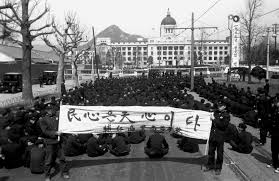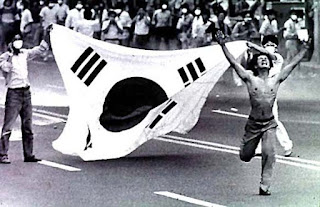The April 19 Revolution's Role in Shaping Modern Korea
Background of the April 19 Revolution
The April 19 Revolution, which took place on April 19, 1960, was a democratization movement in South Korea, originating from protests against the long-term presidency of Syngman Rhee and election fraud. The Rhee administration had been in power since the establishment of the Republic of Korea in 1948, gradually adopting more authoritarian traits. In the presidential election held on March 15, 1960, widespread electoral fraud was committed, which greatly angered the citizens. Particularly, college students, who were at the forefront, began to fight against the government's corruption and authoritarianism.
The Spark of Rebellion: The Masan March 15 Incident
The April 19 Revolution in South Korea, a pivotal moment in the nation's quest for democracy, was deeply connected to the Masan March 15 Incident. This incident was the catalyst that ignited the flames of resistance against the authoritarian regime of President Syngman Rhee. On March 15, 1960, during the presidential elections, the citizens of Masan took to the streets to protest against the widespread electoral fraud perpetrated by Rhee's government. The protest was met with brutal police violence, leading to the death of a student, whose body was later found in the harbor with evidence of torture. This tragic event sparked public outrage and exposed the corruption and brutality of the Rhee administration.
Key Figures
- Syngman Rhee: The first president of South Korea, who was the primary target of the April 19 Revolution. His long-term presidency and electoral fraud were major causes of the revolution.
- Cho Bong-am: Founder of the Progressive Party and a presidential candidate in 1956 against Syngman Rhee. He supported democratic and socialist values but was executed due to his incompatible stance with the anti-communist zeitgeist of the era.
- Students and university students: These individuals provided the main momentum for the revolution, organizing large-scale protests against the government's corruption and dictatorship.
Nationwide Uprising: The April 19 Revolution
The news of the Masan incident spread rapidly across the nation, fueling existing discontent and leading to organized protests in multiple cities, including Seoul. As students and citizens learned about the government's repressive actions and the manipulation of the electoral process, the protests grew in intensity and size. These demonstrations culminated in the April 19 Revolution, a series of mass protests primarily led by university students in the capital. The protesters demanded an end to Rhee's corrupt practices, the restoration of democratic governance, and justice for the victims of government brutality.
From Local Outrage to National Change
The April 19 Revolution and the Masan March 15 Incident are thus inextricably linked, with the latter serving as the spark that set off a nationwide movement for change. The brutal suppression of peaceful protestors in Masan highlighted the regime's disregard for democratic principles and human rights, galvanizing a broader segment of the Korean population to demand political reform. The success of the April 19 Revolution, which led to the resignation of Syngman Rhee and the brief establishment of a more democratic government, marks a significant chapter in South Korea's history, demonstrating the power of collective action and the importance of standing up against tyranny.
Impact of the Revolution
The April 19 Revolution marked a significant turning point in modern Korean history, leading to the resignation of President Syngman Rhee and the brief establishment of a more democratic government under Prime Minister Chang Myon. Although democracy receded following the May 16 military coup, the April 19 Revolution had a significant impact on the development of democracy in Korea and remains a symbolic event in the democratization movements.
Global Impact and Significance of the April 19 Revolution
The April 19 Revolution, as one of the democratization movements during the Cold War, garnered significant attention worldwide. It not only brought changes within South Korea but also served as an example of the power of citizens against authoritarian regimes globally. Especially during a period when democratization movements were prevalent in Eastern Europe and some Asian countries, the successful push for democracy in Korea inspired many activists.
Political Significance for the US and East Asia at the Time
Impact on the US:
At the time of the April 19 Revolution, the US supported the Rhee government, but the revolution led the US to emphasize political stability in Korea. The collapse of the Rhee regime highlighted the need for the US to reassess its anti-communist strategy in East Asia. The US subsequently adjusted its policies to support the establishment of a freer and more democratic government in Korea.
Impact on East Asia:
In East Asia, the April 19 Revolution was perceived as a successful model of democracy within the Cold War framework. Neighboring countries like Japan and Taiwan closely observed the democratization movements in Korea, which helped strengthen demands for democracy in their own countries. Particularly, the changes in Korea served as a warning to other anti-communist authoritarian regimes in the region, influencing the democratic processes in various Asian countries for decades to come.
Thus, the April 19 Revolution not only had profound domestic significance but also impacted international politics during the Cold War, leading to significant shifts in the geopolitical landscape of East Asia.
Current Status of Commemoration of the April 19 Revolution
Today, the April 19 Revolution is remembered as an important historical event in South Korea. April 19 is designated as an official commemoration day, with various memorial events held nationwide. The April 19th National Cemetery in Seoul hosts commemorative events to honor the victims, along with various educational programs. These activities play a crucial role in conveying the importance of democracy and historical lessons to the younger generations.
The April 19 Revolution shows the strong desire for democracy among the Korean people and continues to be respected and remembered today. These commemorative activities contribute to the continuation of the revolution's spirit and lay the groundwork for the advancement of democracy.







Comments
Post a Comment